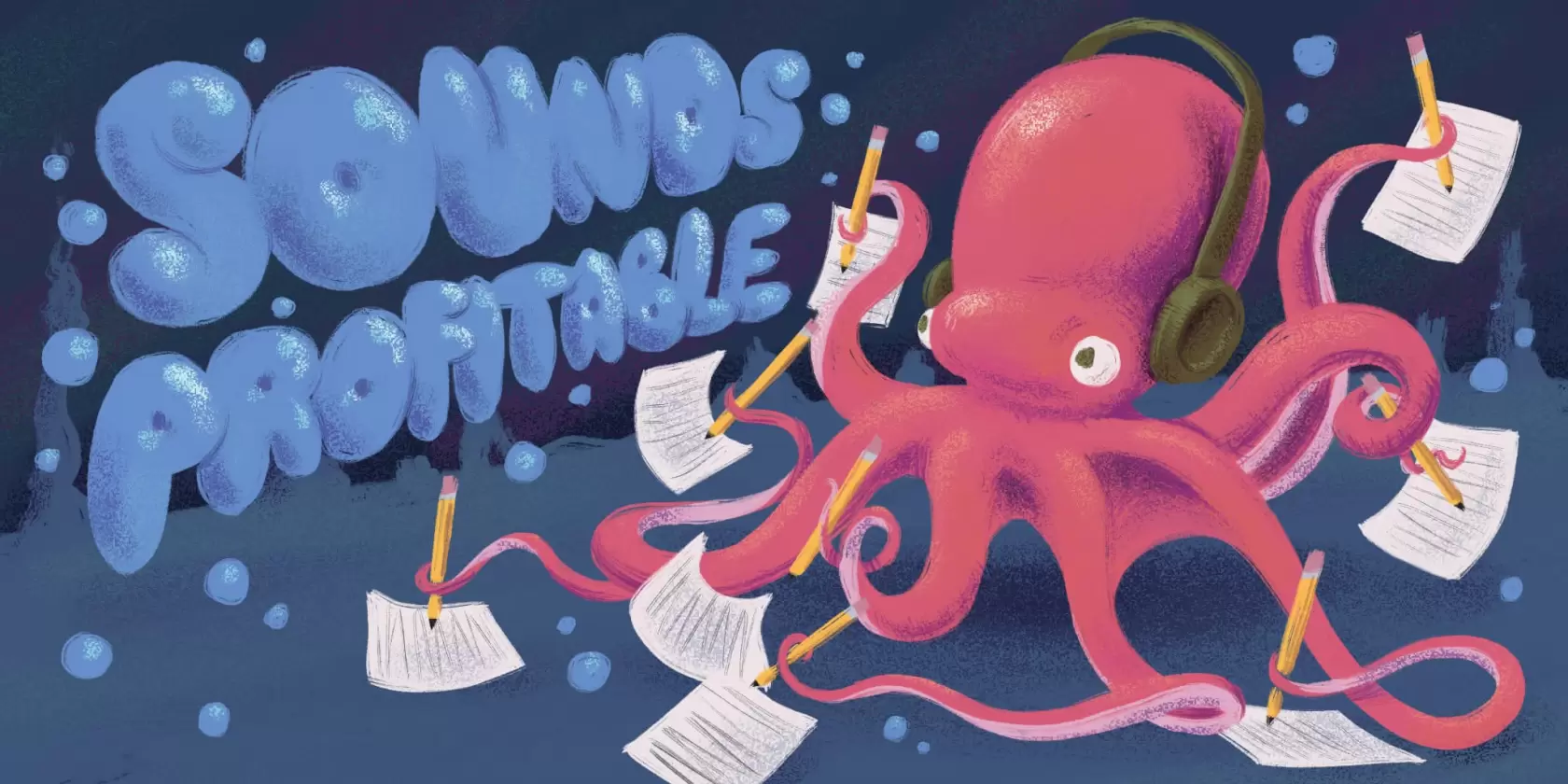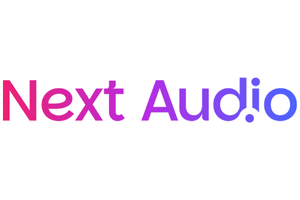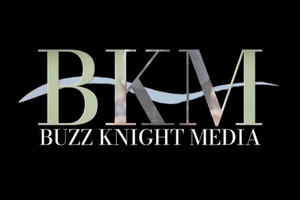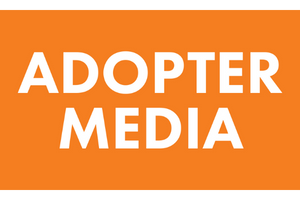This week, Bryan Barletta and Arielle Nissenblatt discuss Podcast Movement: Evolutions, which took place last month in Los Angeles. Overall, they had a blast, met with a ton of industry folks, had some nice meals, and attended some innovative sessions. Bryan and Arielle take time to highlight Evo Terra’s Podcast Hall of Fame acceptance speech Listen in to see what you’re missing!
So much of what podcasters will embrace is based on whether the major podcast apps will also embrace changes and improvements and implement them. While I absolutely understand where that mindset comes from, it’s time that we stop using it as an excuse to not innovate or improve. The podcast advertising industry can actually help drive more podcasters to implement improvements, choosing where to spend their ad dollars as an incentive.
So, let’s kick this week off with some motivation: I truly believe no advertiser should buy inventory on a podcast that doesn’t include transcriptions of their episodes.
Being able to suss out the text from the actual words spoken on a podcast episode is at the core of every bit of innovation built for understanding content in all of advertising. And outside of very few things in podcasting, a deep understanding of the content will be our prime first-party data. From contextualization, to brand suitability, and all of the incredible intelligence tools out there for podcasting. Which is why publishers and their hosting platforms absolutely need to make sure that transcripts accompanying the episodes that they worked so hard to publish originate from their central source of content.
At the core of podcasting is the audio file, and publishers should be doing every single thing they can to own how the rest of the industry ingests what they’ve created.
Why Transcripts Matter
Caroline Mincks wrote a fantastic piece for Sounds Profitable last year titled Let’s Make Podcasts More Accessible where they did a fantastic job of explaining the value of transcripts in making podcasting more accessible. While I hope that providing access to more listeners is a motivating factor, providing transcripts can also simply prevent you from being sued.
There are obvious and overlooked marketing benefits that having transcripts of your episodes can also provide. Like a whole new layer of content to distribute. Finding and sharing clips of an episode, in text, audio, or video. Search engine indexable information. And much more.
But if we take it one step further, the only thing that a publisher truly controls in the podcast ecosystem is the content itself. So, if a publisher painstakingly went to all the effort of building a high-quality podcast and selling ads for that show, why wouldn’t they provide the transcription that brand safety, brand suitability, and contextual advertising will be based on?
Transcription Delivery Needs Improvement
If you’re on a hosting platform that offers transcription services or one that allows you to upload a transcript, that transcript is publicly shared through the RSS feed. But that doesn’t mean any of the major podcast players do anything with that file. And even if those players did accept the transcript, if the podcast uses dynamic ad insertion (DAI)–which an overwhelming majority of monetized podcasts do—the transcript won’t line up correctly with the timestamps of the episode post-insertion.
But that isn’t a reason to dismiss transcripts. Each transcript, provided by the publisher or created on the publisher’s behalf, offers the ability for advertisers to understand not just the show they’re buying, but the individual episode. That text can be used to identify keywords, IAB categories, and safety frameworks such as GARM, all tools commonly used in other digital advertising channels to give advertisers further clarity on what they’re buying.
But we absolutely can do better as an industry.
When a listener presses play on an episode, the hosting platform builds a unique MP3 file full of dynamically inserted ads and sends it to them. At that moment, it’s also absolutely possible to build a unique transcript for that unique MP3, that takes into account the ads and places the transcript directly into the ID3 tag of the episode.
Hosting platforms would need to take the original transcription for the core content of the episode, and when inserting ads into the episode, either provide the transcription for the ads (which honestly, would be fantastic) or simply provide enough space in the transcript to not mess up the synchronization. That way, each download would work perfectly inside any player that chose to use the transcription.
With this level of accuracy, and the content coming directly from the publishers themselves, it makes it a far stronger case to set the standard that the major podcast players should accept and display the transcript over the player handling it themselves.
Not Everything in RSS is for Players
The justification for podcast technological advancement (or stalling) revolves around two things: what the podcast players will do and monetization. Developers of podcast players will find themselves hard-pressed to ignore publisher-provided transcripts if a substantial amount of the top podcasts are providing them. But that clearly hasn’t been enough motivation for this feature to become commonplace yet.
That’s why I really am suggesting advertisers move money away from shows that don’t provide transcripts. For every show making transcripts available today, an advertiser is empowered to manually double-check the content of multiple episodes in the time it might take for them to normally listen to just one. And if we add third-party tools into the mix, that can go even faster. As advertisers demand this level of transparency, it makes it incredibly easy to apply safety, suitability, and contextual guidelines on every level of podcast advertising. Those safeguards particularly make it easier for advertisers to buy across more shows, whether sold network direct or programmatically, as there’s an auditable process in place to make sure their brand association needs are met.
I expect hosting platforms to start providing AI transcription as a competitive advantage to draw in more publishers, as the need for contextual podcast data will only continue to increase. And with so many hosting platforms also providing monetization solutions, the more competitive platforms will offer this for free as that data becomes incredibly valuable to the advertisers the hosting platforms are selling to as well.
While AI transcriptions can get publishers pretty far, with some solutions in the 90%+ accuracy range, a publisher having the option to manually review and improve the transcription before publishing it can make a world of difference. Just think about how a third-party competitive intelligence platform might classify a show if the transcript refers to a minor when the host really meant miner. And the publisher would have no way of knowing.
Wrapping It Up
Advertisers should always know exactly what they’re buying.
Publishers should own every representation of their content in the wild.
Hosting platforms should enable both parties to successfully engage, as often as possible.
But the area that excites me the most in this scenario is the competitive intelligence platforms.
How many podcast adtech companies do you think are actively transcribing Pod Save America? How many do you think are transcribing Sounds Profitable? My gut says the first is somewhere around 10 and the second is more likely 0 than 1. Focusing from the top down is incredibly smart when ”[…]you now need only to buy run-of-network advertising on four networks to reach 50% of weekly podcast consumers”, but what about all the amazingly successful niche podcasts out there that advertisers want to know about? How can they ever expect to be indexed in a world where they’re not able to easily provide their own transcripts?
At the end of the day, the only people who lose by not pushing for transcription in podcasting are publishers.
Because advertisers will always get their needs met from hosting/monetization platforms and competitive intelligence tools. And since they have limitations, and choose what shows to monitor as representative of the podcast space, many incredibly monetizable publishers might just find that they fall just short of what these tools choose to highlight.
New Sponsors
Sounds Profitable exists thanks to the continued support of our amazing sponsors. Each sponsor receives one hour of consulting per month as a way to say thanks.
- Female Startup Club helps women building impactful ecommerce businesses through girlfriend-to-girlfriend style conversations that dig into the blueprint of money, marketing & mistakes.
- Vizzy provides podcast software that allows creators to enrich their episodes with visuals and interactive features that allow additional monetization and engagement.
Want to learn more about sponsorship? Hit reply!
Rel’s Recs
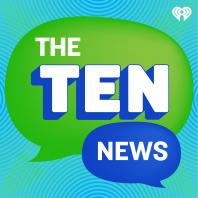
Arielle Nissenblatt of EarBuds Podcast Collective this week has chosen The Ten News from Small But Mighty Media, Next Chapter Podcasts and iHeartPodcasts.
I’m fascinated by podcasts for kids and the future of kids’ audio. The Ten News brings us short, succinctly-written episodes, made for kids to enjoy alongside their adults. This show doesn’t sound like it’s talking down to the audience it’s targeting, but, instead, empowering them. They acknowledge their listener base by throwing in references to Fortnight and other things kids are vibing with nowadays.
Market Insights with Magellan AI
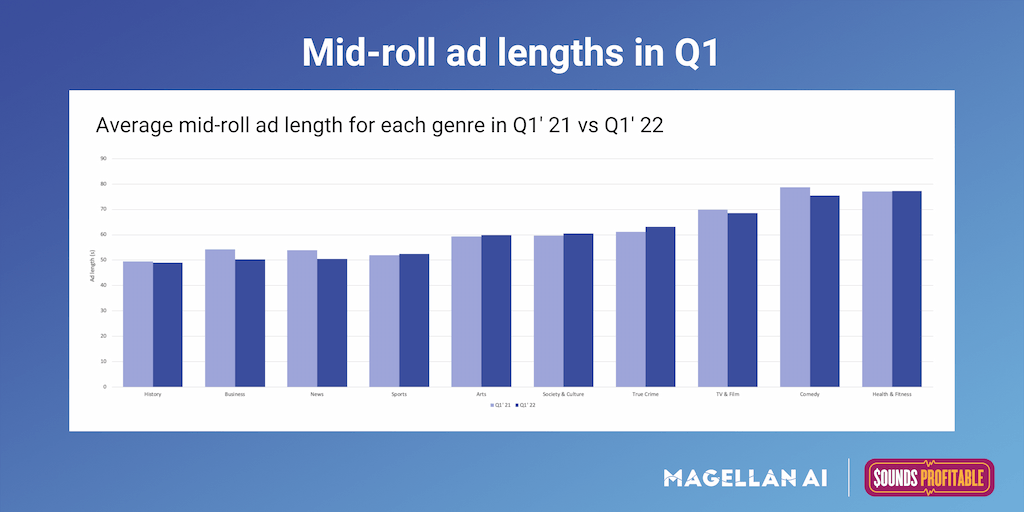
Over the last couple of weeks we have been comparing some notable differences between the most popular podcast genres. This week we wanted to keep with that theme by analyzing the difference in mid-roll ad lengths across genres in Q1′ 21 and Q1′ 22.
Mid-roll ads made up 56% of the ads analyzed across the top 10 genres in Q1′ 22. Average ads lengths ranged from 50s on genres like History, Business, and News to 70s on genres like Comedy and Health & Fitness. Compared to last year ad length decreased slightly in 2022, most notably in the News, Comedy, and Business genres.
Interested in more insights about new brands? Download the Q4 Podcast Advertising Benchmark Report for the full analysis.
Anatomy of an Ad with ThoughtLeaders

What makes a good podcast ad? You know it when you hear it, sure. But is there more to it? We’ve teamed up with ThoughtLeaders to break down what works, what doesn’t, and what it takes to make great ads.
This week’s Anatomy of an Ad breaks down a host-read for Canva presented by Matt DeCoursey, Matt Watson, Lauren Conoway, and Andrew Morgans, hosts of the podcast Startup Hustle.
Find out what worked well and what could be improved upon as you work to make your own ad reads better.

